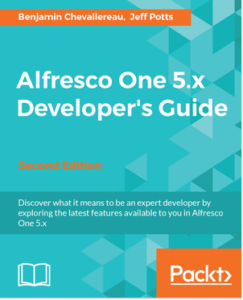 After more than 8 years since it was first published, Packt has published a second edition of the Alfresco Developer Guide. Much like the Alfresco product itself, the overall approach and architecture of the book is fundamentally the same, but Ben Chevallereau has given it much-needed updates by adding Share, SDK, and Application Development Framework coverage as well as bringing everything else up-to-date.
After more than 8 years since it was first published, Packt has published a second edition of the Alfresco Developer Guide. Much like the Alfresco product itself, the overall approach and architecture of the book is fundamentally the same, but Ben Chevallereau has given it much-needed updates by adding Share, SDK, and Application Development Framework coverage as well as bringing everything else up-to-date.
Before I talk about what’s in the book, I should mention that although the title says “Alfresco One” the book is applicable to both Community Edition and Enterprise Edition. I honestly have no idea why the “One” got added, but that’s a minor quibble.
The first four chapters are essentially the same, with updates here and there to match recent software releases. Chapter 1 introduces content management and Alfresco. Chapter 2 discusses the Alfresco way to develop extensions and customizations. Chapter 3 dives into content modeling. Chapter 4 explains actions, behaviors, transformers, and extractors.
Chapter 5 is when the first serious departure from the first edition occurs. That’s because when the first edition was published, Alfresco Share was just being created. The second edition uses Chapter 5 to discuss Share customizations, primarily focusing on Surf, but also touching on Aikau where it is relevant.
Chapter 6 further expands on application development by exploring the new Application Development Framework based on Angular2.
Chapter 7 returns to familiar territory with web scripts and Chapter 8 covers advanced workflow, although in the second edition it is exclusively focused on Activiti rather than the old jBPM engine.
Chapter 9 is kind of a grab bag of new feature coverage such as the Search Manager and Smart Folders. It also throws in a light example of developing a mobile client for Alfresco using Appcelerator.
Chapter 10 focuses on security and covers the same topics as the first edition (LDAP, SSO, and custom permissions) but with obvious updates.
The appendices originally in the first edition were cut completely which would have been a pain to update. And with the improvements made in the Alfresco-provided documentation over the last eight years they really no longer add much value.
Overall, I think the book still meets its goal of being the quintessential reference for anyone getting started with Alfresco development.
Many people have come up to me over the years and said, “I got my start with Alfresco thanks to your book,” and that makes me happy because that’s exactly what it was for. I’m glad that this new edition will enable a whole new generation of people to get up-to-speed and join us in the vibrant Alfresco community.
The credit for the hard work on the update goes to Ben–you did a great job. We should also recognize Bindu Wavell for the technical editing, which is a huge task. Thanks so much guys!
